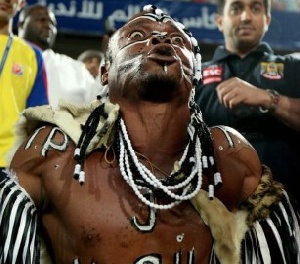Tout-Puissant Mazembe are a rock-solid African footballing institution, one that has been built from firm foundations and grown in stature over the years to fashion a history littered with success stories and achievements, the latest of them their fifth CAF Champions League title, which earned them a place at the FIFA Club World Cup.
It was on this very stage five years ago that TP Mazembe made their name known around the world, becoming the first team outside Europe and South America to reach a Club World Cup final, where they went down to Inter Milan.
Ahead of the Congo DR club’s first outing at Japan 2015, FIFA.com marks their return to the global scene by revealing some of the unique characters and tales that have made the African champions what they are today.
A name that says it all
While Bolivia has The Strongest; the Netherlands Herakles, Achilles, Sparta and Ajax; and Cameroon Tonnerre and Canon, Congo DR has its own intimidatingly named football clubs, the mightiest of which are undoubtedly Tout-Puissant Mazembe. Founded in 1939 as FC Saint Georges Elisabethville – as the city of Lubumbashi was formerly known – the club came under the ownership five years later of the tyre manufacturers Englebert.
The new outfit went unbeaten in their first season in existence, and were promptly renamed Tout-Puissant (“All Powerful”) to mark the feat. In recognition of its black and white kit, the club then added the name “Mazembe”, which means “crows” in Kiswahili, one of the country’s official languages. Just to give them a little more power, the team also received the fearsome nickname of the Badianguena, or “The Crocodile Eaters”.
Let’s do the Kidiboikié
Now 39, Mazembe’s legendary keeper Robert Muteba Kidiaba has won virtually everything there is to win in the African game and has displayed his class between the posts time and again for club and country in his long and illustrious career. There is one thing for which he is perhaps better known than for his saves, however, and that is his curious goal celebration. Every time Mazembe or the DR Congo national team find the back of the net, the flamboyant keeper marks the moment by taking a seat on the ground and bouncing up and down on his backside.
“It started out as an abdominal exercise to help me work on my flexibility on the ground and on my ability to spring back up to my feet,” he told FIFA.com in 2010. “My team-mates laugh when I do it in training. Then, when one of them scores, I just have to express my joy. It’s the only way I can think of doing it.” Now known around the world for his eye-catching “donkey ride” jig, the keeper has even given it a name: “The Kidiboikié”.
Giving it their all
What would a TP Mazembe match be without their army of passionate fans? Les 100 pour 100 (“The 100 Percenters”) as they are known, have proved the most loyal band of supporters since they were founded in 1983 by Kidiaba’s older brother Mutamba Kelemuta. According to the Crows’ website, it all started when future Mazembe chairmen Moise Katumbi spotted a group of young labourers carrying their heavy loads in the street one day. “Why don’t you form a band and come to the stadium?” he said to them. “We could use some atmosphere.”
The youngsters took Katumbi up on his invitation and have been playing loud and proud ever since, a point they proved when their heroes took on Internacional of Porto Alegre at the 2010 Club World Cup in Abu Dhabi. Though massively outnumbered in the stands, The 100 Percenters pumped up the volume in their own inimitable style to silence the massed ranks of Colorado fans.
A little bit of magic
The five-time African champions had a reputation for using more than just tactics and skill to get the better of their opponents, and through to 2003 ran a committee whose brief was to find the best witch-doctor in the world.
For many years TP also enjoyed the protection of a female supporter known as “La Mama”, who followed the team everywhere in the company of her crocodile, while wizards would often take up position behind the goals and break eggs as part of ceremonies design to boost the team’s goalscoring prowess. “I’ve banned all that,” said Chairman Katumbi, who these days prescribes only two magical ingredients for his players: hard work and talent.
Sports Features of Sunday, 13 December 2015
Source: ghanasoccernet.com

















